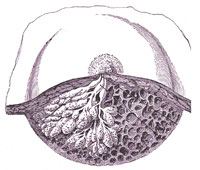Main Menu
Cancer Types
- Appendix
- Bladder
- Bone
- Brain
- Breast
- Cervical
- Childhood cancers
- Endometrial
- Esophageal
- Eye
- Gallbladder
- Gastrointestinal
- Head and Neck
- HIV and AIDS Related
- Kaposi Sarcoma
- Kidney
- Leukemia
- Liver
- Lung
- Lymphoma
- Mesothelioma
- Metastatic
- Multiple Myeloma
- Nasopharyngeal
- Oral
- Metastatic Cancer
- Ovarian
- Pancreatic
- Parathyroid
- Penile
- Prostate
- Rectal
- Recurring Cancers
- Sarcomas
- Secondary (Metastatic)
- Skin
- Squamous Cell
- Testicular
- Thyroid
- Vaginal
- Vulvar
Symptom Management
Treatment Types
- Adjuvant Chemotherapy
- Biological Therapy
- Cesium Chloride
- Chemotherapy
- Abraxane
- Bisphosphonate
- Bleomycin
- Cyclophosphamide
- Dacarbazine
- Docetaxel (Taxotere)
- Doxorubicin (Adriamycin)
- Estramustine
- Etoposide
- Ifosfamide
- Mechlorethamine
- Mitoxantrone
- Oral Chemotherapy
- Paclitaxel (Taxol)
- Pixantrone (Pixurvi)
- Platinum-based chemotherapy
- Prednisone
- Procarbazine
- Tamoxifen
- Vinblastine
- Vincristine
- Vinorelbine
- Chemotherapy Regimens
- Clinical Trials
- Chemoprevention
- Cryosurgery
- Gene Therapy
- Gerson Therapy
- Hormone Therapy
- Laser Therapy
- Platinum-based Therapy
- Radiotherapy
- Surgery
- Targeted Therapies
- Pain Management
- Proton Therapy
- Radioimmunotherapy
- Transplants
- Vaccines
- Watchful Waiting
Topics
Inflammatory Breast Cancer Treatment
Inflammatory breast cancer (IBC) is a very rare subtype of breast cancer that is widely regarded as the most aggressive and the most deadly subtype. It is estimated to affect about 1 percent of all women diagnosed with breast cancer. Because diagnosis is difficult, not all experts agree that IBC is so rare.
Its symptoms, its prognosis, and the treatment options available for inflammatory breast cancer are different from those of other subtypes. For instance, the subtype gets its name from the fact that the affected area of the breast will typically show signs of inflammation like redness and swelling. These symptoms are occurring because the cancer cells in the breast are causing blockage in the body's lymph vessels.
Unlike other breast cancers, inflammatory breast cancer does not cause the familiar lump in the breast that is so frequently the sign of breast cancer. To that end, IBC may not appear on a mammogram. It also affects a slightly younger group of patients than other breast cancers, and it tends to be more common in patients who are either of African-American origin or who are considered obese.
Prognosis of inflammatory breast cancer
Inflammatory breast cancer is almost never found in any stage lower than stage III, meaning it has already spread to other parts of the body by the time it is discovered. This means that its prognosis is not going to be as good as other breast cancers. Whereas women diagnosed with IBC used to live on average no more than about 18 months, those figures have improved to the extent that the 5-year relative survival rate is about 40%, which is less than half that of other breast cancers.
Inflammatory Breast Cancer Treatment
When the disease is discovered at stage III, treatment for IBC generally includes a combination chemotherapy regimen, which is used to shrink the tumors, followed up by adjuvant surgery to remove them. Therapies often are followed up by adjuvant radiation therapy after surgery, and in some cases, more chemotherapy.
The application of these three types of treatment is what has raised the survival rate among patients with IBC, but it remains a difficult regimen, and is not always effective.
The information provided on CancerTreatment.net is designed to support, not replace, the relationship that exists between a patient/site visitor and his/her health professional. This information is solely for informational purposes and does not constitute the practice of medicine. We encourage all visitors to see a licensed physician or nutritionist if they have any concerns regarding health issues related to diet, personal image and any other topics discussed on this site. Neither the owners or employees of CancerTreatment.net nor the author(s) of site content take responsibility for any possible consequences from any treatment, procedure, exercise, dietary modification, action or application of medication which results from reading this site. Always speak with your primary health care provider before engaging in any form of self treatment. Please see our Legal Statement for further information.



